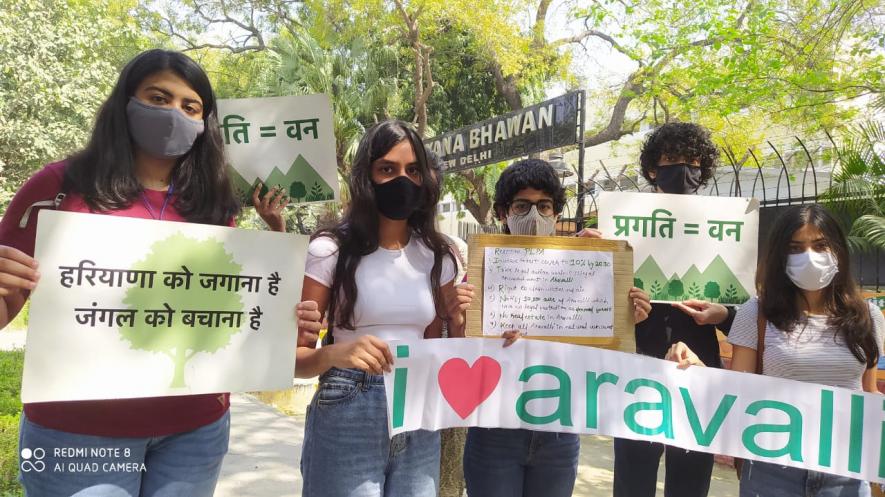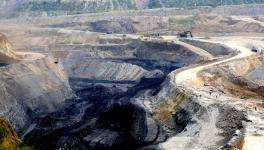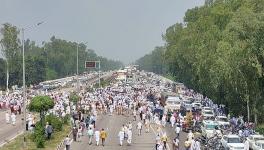Haryana Govt Seeks Court Approval for Mining in Aravallis as Resistance Mounts

The Haryana government has knocked the doors of the Supreme Court to pave the way for legalisation of mining activity in the state’s eco-sensitive Aravalli range. The government has claimed that it has to focus on boosting economic activity owing to the slowdown caused by the pandemic.
Meanwhile, mining in the area is being widely opposed by activists and local residents who say fear further loss of biodiversity and bigger risks of pollution and mining-generated waste. The Supreme Court had banned activity in the region since 2002, after which multiple orders were issued against illegal mining going on in the Aravalli ranges aimed at flattening them.
Activists and lawyers allege that in the garb of economic recovery, the state was continuing its pre-pandemic agenda of benefitting the builder lobby, sidelining citizen’s interests.
A citizen’s movement by the name of “Save Aravallis” has also started a campaign in the public domain against mining activity in the region, they state, “The Aravallis have suffered blow after blow because of the polluting Bandhwari landfill, PLPA Amendment bill, illegal constructions and upcoming waste to energy plant. If mining is legalised, it will be the final death knell for this ancient mountain range older than the Himalayas.”
Speaking with NewsClick, activist Vikrant Tongad who has also filed a petition in the court, appealing for a stay on mining activity said: “The government wants to open up 600 acres of fragile land to the industry, which will adversely degrade the ranges and disproportionately affect the villages, this is based on an older survey carried out by the government which seeks to justify mining in the area.”
The range is approximately 700 kilometers long, stretching across parts of Rajasthan, Gujarat and several districts of Haryana, which include Gurugram, Mewat, Faridabad, Palwal, Rewari, Bhiwani and Mahendragarh.
Aravallis are a biodiversity hotspot with 400+ species of native trees, shrubs and herbs, over 200 native and migratory bird species, butterfly species, reptile species and mammal species including leopards. Aravallis, with their natural cracks and fissures, have the potential to put two million litres of water per hectare in the ground every year.
A 2018 report by a Supreme Court-appointed Central Empowered Committee (CEC) said 25% of the Aravalli range has been lost due to illegal mining in Rajasthan since 1967-68.
Speaking with NewsClick, Haryana-based environmental activist Bhavreen Kandhari said: “Mining in the Aravallis in Haryana was banned by the Supreme Court in 2002 because it is an ecologically sensitive region, critical for ground water recharge. Many court orders have pointed out that disturbing the ecological balance in an already emaciated landscape around Aravalli will further vitiate the air quality and deplete the water table in the surrounding areas of Haryana, threatening the lives of millions living there. Construction and encroachment was always a problem here, and now this devastating step to being in mining is going to cost millions their lives and health.”
Previously, NewsClick had reported how over a thousand acres of ecologically sensitive land in the Aravallis is likely to be left out of the National Conservation Zone (NCZ) by Manohar Lal Khattar-led Haryana government. Approximately, 1126.8 acres– spread across the Aravallis – fall under the ambit of Faridabad's Kot villages.
The Haryana government is likely to go by the 1992 notification of the Ministry of Environment that, while defining the Aravallis, limits them only to Gurugram in Haryana, and Alwar in Rajasthan. Going by the notification, Aravali stretches in Faridabad or Jhajjar will not be considered as part of the NCZ.
Moreover, in 2019, the state had made an active push for the Punjab Land Preservation (Haryana Amendment) Act (PLPA) to be amended. In February this year, it had proposed opening up thousands of acres in the mountain ranges for real estate development and mining. The amendment is still pending as the Supreme Court had sharply rebuked the Haryana government for trying to “destroy the forests''.
Citizens groups are rallying behind the cause to save the ranges. Talking about the demands, Neelam Ahluwalia from the Aravalli Bachao Citizens Movemen,t said: “The petition letter states the citizens’ demand not to legalise mining in the Aravallis, withdraw the regressive Punjab Land Preservation Act Amendment Bill 2019, remove illegal encroachments from the Aravallis, grant forest status to 50,000 acres of Aravallis which have no legal protection, cancel plan to build a polluting waste to energy plant at Bandhwari and increase Haryana’s forest cover to 20% from the measly 3.6% it is currently.”
Get the latest reports & analysis with people's perspective on Protests, movements & deep analytical videos, discussions of the current affairs in your Telegram app. Subscribe to NewsClick's Telegram channel & get Real-Time updates on stories, as they get published on our website.























